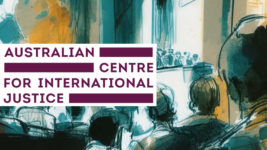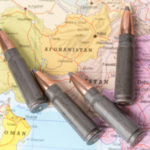Australia Must Introduce a Specialised Atrocity Crime Unit

The photograph that recently emerged of Ben Roberts-Smith and Zachary Rolfe partying at a club in Bali conveys the on the ground reality that criminal justice in this country is increasingly at odds with the concept of justice itself.
Roberts-Smith was recently found to be complicit in four war crimes in the civil jurisdiction, whilst Rolfe was last year acquitted of any criminal act by an NT Supreme Court jury in relation to having fired two shots at point-blank range into the ribcage of 19-year-old Warlpiri man Kumanjayi Walker.
Meanwhile, the government continues to pursue former ADF lawyer David McBride for blowing the whistle on Australian war crimes in Afghanistan, while the Brereton report’s 2020 recommendation that 19 local soldiers be investigated over such crimes has only resulted in one being charged.
That Australian police and prison officers are unofficially exempt from punishment in regard to First Nations deaths in custody has long been understood, however that Australians troops are getting away with war crimes overseas is increasingly becoming a commonplace understanding as well.
And in a report released last week, the Australian Centre for International Justice (ACIJ) has made the case for our government to “establish a permanent, specialised unit to investigate” international atrocity crimes, as this nation’s track record in this regard is “chequered and inconsistent”.
Addressing the gap
The ACIJ’s policy paper Challenging Impunity: Why Australia Needs a Permanent, Specialised International Crimes Unit outlines that despite atrocity crimes having been enacted domestically, there’s a gap in their application that allows most people who commit such crimes to evade justice.
“Is there a way for this impunity gap to be addressed?” the ACIJ asks and answers affirmatively that it is possible via “the investigation and prosecution of international crimes, within domestic legal systems, under the principle of universal jurisdiction and other forms of extraterritorial jurisdiction”.
The ACIJ is calling for a specialised investigation unit that’s independent of government that would rely on universal jurisdiction to enable it to investigate and prosecute atrocity crimes “regardless of the place where they were committed or the nationality of the perpetrator or the victim”.
“The establishment and work of such a unit would help to offer a pathway for justice and accountability within Australia and our region for survivor communities of egregious international crimes, namely war crimes, genocide, crimes against humanity and torture,” the policy paper reads.
The report further asserts that a specialised unit must be created as when general duty AFP officers have been relied upon to pursue such matters in the past, they’ve always resulted in “investigative failures”, as has been illustrated in the slow-drip pursuit of those implicated by Brereton.
No repercussions for the majority
Established under the 2002 Rome Statute, the International Criminal Court (ICC) is an intergovernmental organisation and international tribunal that investigates and prosecutes those who perpetrate serious international crimes.
Today, 123 member states are a party to the Rome Statute, which establishes and defines the various forms of four broad international crimes, which include genocide, crimes against humanity, war crimes and crimes of aggression.
However, the ICC has only pursued 31 cases over its time in operation. Indeed, most perpetrators of atrocity crimes are never prosecuted. And as the ACIJ report points out, the international court actually provides a framework whereby most prosecutions should be pursued in domestic courts.
When a state ratifies the Rome Statute, it is required to establish international atrocity offences in its own domestic law.
So, as the statute took effect in Australia in September 2002, atrocity crimes were inserted into the Criminal Code Act 1995 (Cth) at that time.
Whilst in 2010, the offences set out in the Convention against Torture and Other Cruel, Inhuman or Degrading Treatment or Punishment were also enacted into federal law.
And today, divisions 268 through to 274 of the Criminal Code contain the various atrocity and torture offences.
“The ICC relies upon states taking a rigorous approach to the investigation and prosecution of international crimes at the national level,” explains the report. “Prosecutions in domestic courts under the principle of universal jurisdiction can provide an important avenue for accountability.”
And other ICC state parties, especially those in the EU, have taken up the responsibility that the Rome Statute bestows upon them, via their having commenced prosecuting extraterritorial cases under assumed universal jurisdiction.
Over the two years 2021 and 2022, 216 international criminal charges went before domestic courts in member states, with 74 accused of such atrocities and 38 convictions resulting. And the ACIJ report also notes that since 2016, there has been a 44 percent increase in the take up of such cases.
Yet, despite having ratified the Rome Statute and codified atrocity crimes into domestic law, Australia continues to disregard its international obligations to pursue these prosecutions, which is in large part due to its inability to adequately investigate them.
Specialised investigative units
The Challenging Impunity position paper further outlines that 23 countries have established the type of specialised atrocity criminal investigation unit that it recommends Australia should create. And these nations include Germany, Sweden, the United Kingdom, France, the US and Canada.
“Under international law, Australia has a responsibility to investigate and prosecute international crimes in certain circumstances,” the report continues.
And the international crimes that are enshrined in our domestic law permit Australian authorities to investigate and prosecute such atrocities regardless of where they were committed.
Section 15.4 of the Criminal Code provides Australia with the extraterritorial jurisdiction to prosecute atrocity crimes that haven’t been committed on domestic soil and as well, when the perpetrator is not an Australian citizen.
But such prosecutions require the attorney general’s consent. And in the past, private prosecutions filed against then Sri Lankan president Mahinda Rajapaksa in 2011 and another filed against then Myanmar state counsellor Aung San Suu Kyi in 2018 were both blocked by the AGs then in office.
Shirking on responsibilities
Under the Hawke government, Australia did establish a special investigations unit in 1987, which had a focus on locating Nazi perpetrators that may have migrated to the country post-World War II.
Disbanded in 1992, the SIU carried out 871 investigations in its time. It identified 27 suspected war criminals. The unit referred four of these cases to the Commonwealth Director of Public Prosecutions. Three of these were pursued in the courts, but none resulted in a finding of guilt.
Since then, our nation’s reliance on “ad hoc war crimes units” and generalised AFP officers to pursue atrocity crimes has ensured that Australia continues to fail to comply with its international obligations to pursue such serious crimes because there’s no ability to develop and retain expertise.
A permanent specialised unit to investigate and prosecute atrocity crimes would create a focused and nuanced approach to tackling such matters, which, over time, would result in the development of a knowledge base and techniques, as well as establishing a network of international relationships.
However, the Australian system continues to deny the need for a sustained and consistent commitment to such investigations, which means the nation remains a safe haven for past perpetrators of serious international crimes.
“If such a commitment is made, then national investigations and prosecutions for international crimes have the opportunity to provide access to justice for survivor communities,” the ACIJ report authors state in conclusion.
And this would include “those within Australia-based diaspora communities who otherwise have an extremely limited ability to make complaints about serious international crimes that they have experienced”.







